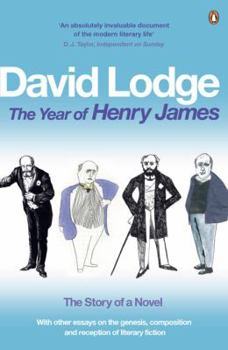The Year of Henry James: The Story of a Novel
Select Format
Select Condition 
Book Overview
In 2004, three major novels featuring Henry James as a character were published - one of them went on to win the Booker Prize. It was not David Lodge's Author Author. In this fascinating new book, a kind of postscript to his novel, Lodge traces the conception, writing and publication of his book, and reveals with extraordinary candour and revealingly comic moments the poignancy and indeed anguish of discovering too late that others were working on the same subject, and the odd feelings of rivalry and jealousy that this engendered. The result is a wonderfully comic work with serious psychological and literary insights which suggests nothing less than a short story by the Great Master, James, himself.
Format:Paperback
Language:English
ISBN:0141026804
ISBN13:9780141026800
Release Date:January 2008
Publisher:Penguin Group
Length:332 Pages
Weight:0.54 lbs.
Dimensions:0.9" x 5.6" x 7.7"
Age Range:18 years and up
Grade Range:Grade 12 and higher
Customer Reviews
1 rating
"Zones of Irony"
Published by Thriftbooks.com User , 17 years ago
The title piece in this collection of essays on literary fiction is a witty and informative account of what happened in 2003-4 when two novelists of distinction (David Lodge and Colm Toibin) coincidentally chose to base new works on the miseries (the failure of "Guy Domville") and then final splendor (the "Major Phase" of novel writing) in the life of the incomparable Henry James. Particularly insightful is Lodge's detailing of certain novelties in recent decades in the marketing and publicizing of literary fiction. Prizes such as the Man Booker and comparative reviews in the media helped in the present case to create an atmosphere of competition between the novelists neither Lodge nor Toibin sought. For publishers and sneaky literary agents, not literary quality but mere "timing was all." Lodge's judgment is that the earlier published Toibin "won" their media induced contest. As for the comparative literary worth of the two books, Lodge reserves judgment, as he has yet to read Toibin's effort. A central irony Lodge savors is the accidental parallel of his case to that of James and George Du Maurier. Just as James' play "Guy Domville" failed, his friend Du Maurier had a popular triumph with the novel "Trilby," a triumph James himself had always sought, for no writer was hotter after the buck or widespread acclaim than James. James' problem, apparently, was that he couldn't write badly enough for popular success, no matter how hard he might have tried. Du Maurier's happier fate came from a work dealing with subject matter James himself - irony of ironies - had earlier considered treating. Lodge's urbane consolation concerning his own novel's worth lies in his conclusion that despite the modern engines of marketing and publishing practices, "timing is not all." Rather, the question with literary fiction and cultural mission is still Dr. Johnson's, "Does the literary work withstand the test of time?" "Only time" and not corporate business timing "will tell."





